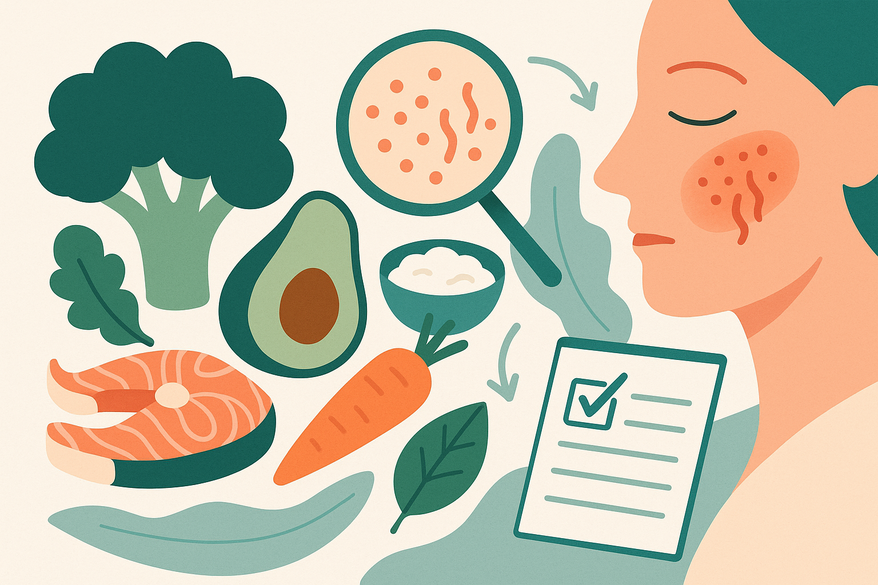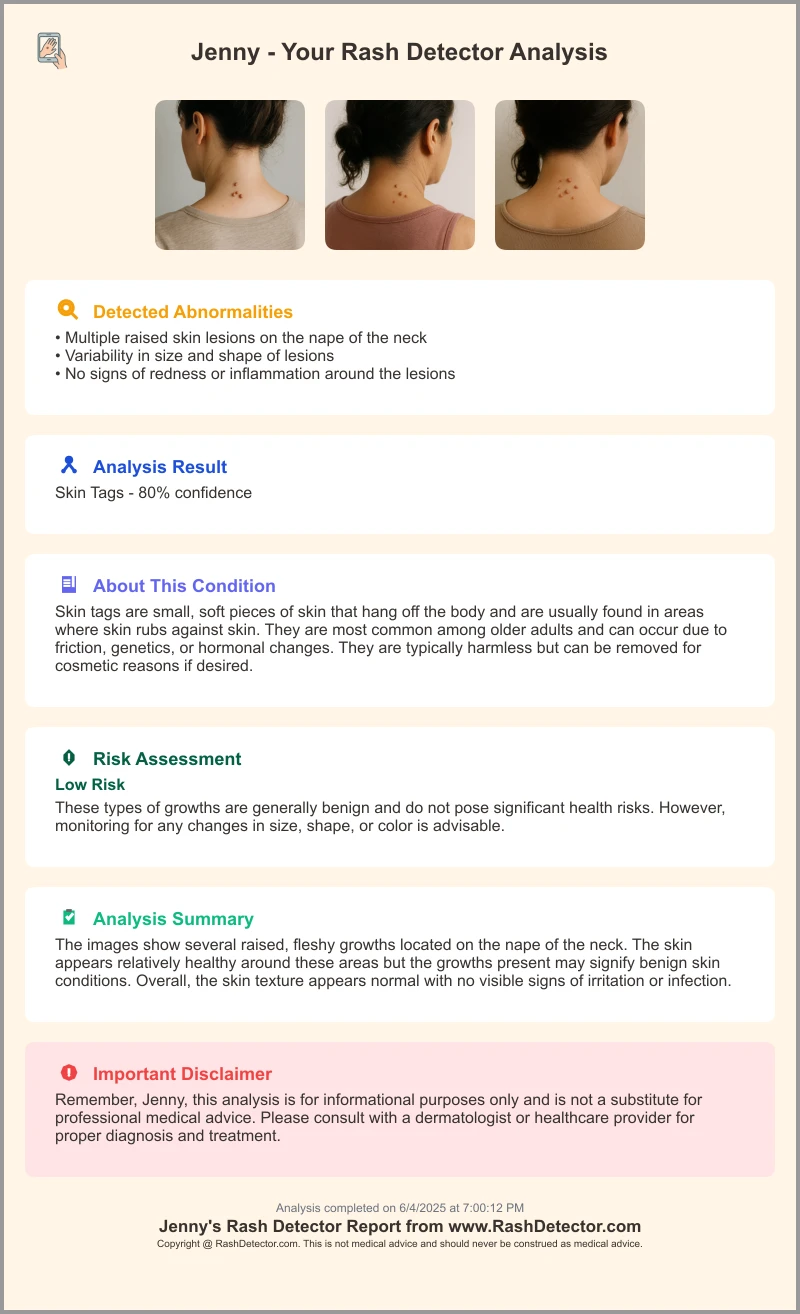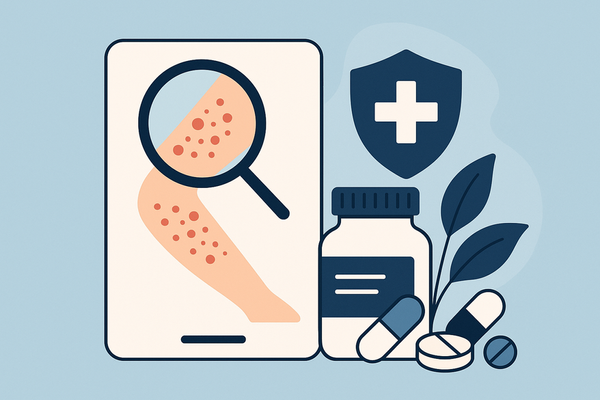Foods That Reduce Skin Inflammation: An Evidence-Based Guide for Eczema
Discover foods that reduce skin inflammation to manage eczema effectively. Learn dietary strategies and lifestyle tips for clearer, calmer skin.

Estimated reading time: 8 minutes
Key Takeaways
- Diet plays a key role in managing eczema by reducing skin inflammation.
- Certain foods provide antioxidants, omega-3s, and probiotics to calm eczema flare-ups.
- An anti-inflammatory diet emphasizes whole, unprocessed ingredients over refined sugars and trans fats.
- Practical meal plans and transition strategies make dietary changes sustainable.
- Tracking your skin’s response and working with healthcare professionals optimize results.
Table of Contents
- Understanding Skin Inflammation and Eczema
- Overview of Dietary Strategies
- Detailed Discussion of Key Anti-Inflammatory Foods
- How These Foods Support Skin Health
- Practical Tips for Incorporation
- Additional Lifestyle Considerations
1. Understanding Skin Inflammation and Eczema
Skin inflammation is the body’s immune response to irritants, injuries, or allergens, manifesting as redness, swelling, warmth, and itching. In eczema (atopic dermatitis), this reaction becomes chronic, damaging the skin barrier and increasing infection risk.
- Eczema drivers: Overactive immune system, genetic predisposition.
- Common triggers: Environmental allergens (pollen, dust mites), stress, certain foods containing inflammatory compounds.
- Inflammatory cascade: Cytokines (IL-4, IL-13) and histamine trigger redness and itch.
Fortunately, some foods contain bioactive compounds that interrupt this cascade, helping restore immune balance and calm eczema flare-ups.
Research sources: Nuffield Health article, Medical News Today article.
2. Overview of Dietary Strategies
An anti-inflammatory diet emphasizes nutrients and phytonutrients that neutralize free radicals, modulate immune responses, and support gut health. By focusing on whole, unprocessed ingredients, you limit exposure to pro-inflammatory agents like refined sugars and trans fats.
- Antioxidants: Vitamins A, C, E, polyphenols, flavonoids combat oxidative stress.
- Healthy fats: Omega-3s (EPA, DHA, ALA) downregulate inflammatory cytokines.
- Fiber & phytonutrients: Prebiotics and polyphenols feed beneficial gut bacteria, reinforcing the gut-skin axis.
- Low processed content: Minimizing refined carbs and red meats prevents inflammatory marker spikes.
Shifting to this diet helps your body manage immune reactions and may reduce the frequency and severity of eczema flare-ups.
Research sources: Cleveland Clinic article, Medical News Today article.
3. Detailed Discussion of Key Anti-Inflammatory Foods
3.1 Fatty Fish (salmon, sardines, herring)
Definition & benefits:
- Rich in EPA and DHA omega-3 fatty acids, which inhibit pro-inflammatory enzymes (COX, LOX).
- Support skin barrier integrity by incorporating into cell membranes.
Evidence: Clinical studies link regular salmon intake with reduced redness and itch severity in atopic dermatitis patients.
Tip: Aim for two to three 4-ounce servings per week.
3.2 Leafy Greens (spinach, kale, Swiss chard)
Definition & benefits:
- High in vitamins A, C, E, K, magnesium, and phytonutrients like lutein and zeaxanthin.
- Counteract oxidative damage in skin cells, promoting barrier repair.
Evidence: Diets rich in leafy greens correlate with lower serum inflammatory markers (CRP, IL-6).
Tip: Blend greens into smoothies or toss raw in salads daily.
3.3 Berries (blueberries, strawberries, blackberries)
Definition & benefits:
- Packed with flavonoids (quercetin, anthocyanins) that modulate histamine release.
- Provide vitamin C for collagen synthesis and skin repair.
Evidence: Observational studies show quercetin reduces inflammatory cytokine production in skin models.
Tip: Freeze a cup of mixed berries and add to oatmeal or yogurt.
3.4 Nuts and Seeds (walnuts, flaxseed, chia seeds, sunflower seeds)
Definition & benefits:
- Contain ALA omega-3, magnesium, zinc, and vitamin E—all key for anti-inflammatory action.
- Improve lipid profiles and support cell membrane health.
Evidence: Higher nut and seed intake associates with lower plasma CRP levels.
Tip: Stir 1 tablespoon of ground flaxseed into cereal or yogurt each morning.
3.5 Whole Grains (oats, quinoa, brown rice)
Definition & benefits:
- Offer fiber, B-vitamins, and polyphenols that feed gut microbiota and stabilize blood sugar.
- Lower glycemic load reduces systemic inflammation.
Evidence: Whole-grain consumption links to reduced IL-6 and TNF-α levels in clinical cohorts.
Tip: Swap white rice for quinoa or brown rice in lunch bowls.
3.6 Probiotic Foods (yogurt, kefir, sauerkraut, tempeh)
Definition & benefits:
- Contain live cultures (Lactobacillus, Bifidobacterium) that balance gut flora.
- Enhance gut-skin axis, reducing allergen penetration and systemic inflammation.
Evidence: Kefir consumption improved eczema severity scores in small pilot trials.
Tip: Include a 4-ounce serving of plain probiotic yogurt with meals.
3.7 Foods High in Quercetin (apples, onions, broccoli, green tea)
Definition & benefits:
- Quercetin stabilizes mast cells and dampens histamine release.
- Potent antioxidant protecting skin from UV-induced oxidative damage.
Evidence: Observational studies show higher apple and onion intake correlates with fewer eczema flare-ups.
Tip: Sip one to two cups of green tea daily.
4. How These Foods Support Skin Health
Understanding the mechanisms behind these foods helps you choose targeted ingredients:
- Antioxidant Properties: Free-radical scavengers in berries, leafy greens, and quercetin-rich foods neutralize oxidative stress that breaks down collagen.
- Omega-3 Fatty Acids: EPA and DHA produce resolvins and protectins—lipid mediators that actively resolve inflammation.
- Vitamins & Minerals: Vitamin A promotes cell turnover; C and E support collagen and barrier repair; zinc and selenium act as cofactors for antioxidant enzymes.
- Probiotics & Gut-Skin Axis: Live cultures improve intestinal barrier integrity and modulate T-cell responses, lowering eczema severity.
Sources: Medical News Today article, Nuffield Health article, Healthline article.
5. Practical Tips for Incorporation
Sample 1-Day Anti-Inflammatory Meal Plan:
- Breakfast: ½ cup oats with ½ cup mixed berries, 1 tablespoon walnuts, 1 cup green tea.
- Morning Snack: Apple slices with 1 tablespoon seed butter.
- Lunch: Grilled salmon over spinach and kale with cherry tomatoes and olive oil-lemon dressing.
- Afternoon Snack: Plain yogurt with 1 teaspoon ground flaxseed.
- Dinner: Pan-seared sardines with quinoa, roasted sweet potato, steamed broccoli, and sauerkraut.
Transition Strategies:
- Introduce one new food per week and track skin responses in a journal.
- Swap processed snacks for a handful of nuts, seeds, or fresh berries.
- Cook with extra-virgin olive oil instead of butter to boost healthy fats.
- Reduce refined sugar by opting for fruit-based desserts or small amounts of raw honey.
6. Additional Lifestyle Considerations
- Hydration: Aim for 8–10 cups of water daily; herbal teas like chamomile add extra antioxidants.
- Stress Management: Mindfulness, yoga, or deep-breathing practices can lower cortisol and inflammatory cytokines.
- Sleep & Skin Care: Aim for 7–9 hours of quality sleep and use gentle, fragrance-free moisturizers.
- Holistic Approach: Combine diet with medical treatments and monitor nutrient status with professionals.
To objectively track your skin’s response, consider using the AI skin analysis app Rash Detector. Below is a sample analysis report:

FAQ
Q: Can diet alone cure eczema?
A: While dietary changes can significantly reduce inflammation and symptoms, eczema is multifactorial. A combination of diet, skin care, stress management, and medical treatments typically yields the best results.
Q: How quickly can I expect to see improvements?
A: Individual responses vary, but many people notice improvements within 2–4 weeks of consistent dietary shifts and lifestyle adjustments.
Q: Are there any foods I should avoid?
A: Common triggers include dairy, eggs, soy, nuts, and nightshades for some individuals. An elimination approach can help identify personal sensitivities.
Q: Do probiotics really help eczema?
A: Probiotics can support the gut-skin axis by balancing gut flora and reducing systemic inflammation. Studies show positive impacts on eczema severity with regular intake.





